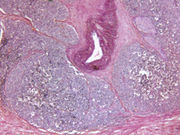Patients with higher heterogeneity score did not respond well to hormone therapy
WEDNESDAY, Jan. 6, 2016 (HealthDay News) — For patients with metastatic castration-resistant prostate cancer (mCRPC), phenotypic and genomic heterogeneity in circulating tumor cells (CTCs) is associated with response to hormone therapy, according to a study scheduled to be presented at the American Society of Clinical Oncology’s annual Genitourinary Cancers Symposium, held from Jan. 7 to 9 in San Francisco.
Howard I. Scher, M.D., from the Memorial Sloan-Kettering Cancer Center in New York City, and colleagues aimed to develop biomarkers of heterogeneity from the analysis of single cells from patients with mCRPC. The Epic Sciences platform was used to analyze 221 blood samples from 179 unique patients about to begin hormonal therapies targeting the androgen receptor or taxanes.
The researchers found that patients with more variation in CTC appearance and genetic make-up did not respond well to hormone therapy. Patients with a high heterogeneity score had shorter progression-free survival (five versus 17 months) and overall survival (nine months versus not reached) than those with a low heterogeneity score. Heterogeneity scores were not associated with chemotherapy response.
“Not all men respond equally to either enzalutamide or abiraterone, and some men don’t respond at all,” Scher said in a statement. “If the test is validated, it could be used to help select the treatment to which a patient is more likely to respond, sparing the toxicities that may result from one that is ineffective.”
Several authors disclosed financial ties to pharmaceutical and biotechnology companies, including Epic Sciences.
Copyright © 2016 HealthDay. All rights reserved.








